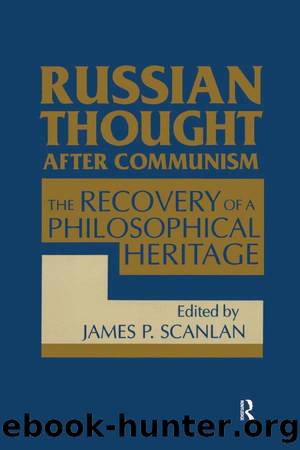Russian Thought After Communism: The Rediscovery of a Philosophical Heritage: The Rediscovery of a Philosophical Heritage by James P. Scanlan

Author:James P. Scanlan [Scanlan, James P.]
Language: eng
Format: epub
Tags: Communism; Post-Communism & Socialism, Political Science, General, Political Ideologies
ISBN: 9781315483511
Google: cr4YDQAAQBAJ
Goodreads: 32207017
Publisher: Routledge
Published: 1994-11-01T00:00:00+00:00
BERNICE GLATZER ROSENTHAL
6
Merezhkovskiiâs Readings of Tolstoi: Their Contemporary Relevance
The ancient Greeks had Homerâs Iliad and Odyssey, the Arabs have the Koran, we have the novels of Tolstoi and Dostoevskii.
Iurii Davydov, 19821
Dmitrii Merezhkovskiiâs L. Tolstoi and Dostoevskii, Life and Art. A Study (1900â1901) opens with a predictionâthe choices of his generation of Russians will âdetermine the future, not only of Russia, but of the entire world.â2 Merezhkovskii was referring to the religious choices of persons who matured in the 1870s and 1880s. He believed that the apocalypse was imminent, that Russians must choose between Christ and Anti-Christ, and that literature should guide them. The life and work of great writers served as a text from which to proselytize his own ideas. The very first work to treat Tolstoi and Dostoevskii as religious writers, Merezhkovskiiâs study contrasted the life, work, and religion of one with the other, and with Nietzsche. Partly because of Merezhkovskiiâs prominence as the initiator and chief proselytizer of God-seeking, his study became the point of departure for early twentieth-century discussions of the two literary giants.3 He was a cofounder of the Religious-Philosophical Society of St. Petersburg and of the review Novyi putâ (New path, 1903â4), and his historical novels were international best-sellers.
Merezhkovskiiâs prediction came true. The choices made by his generation, to which Gorâkii and Lenin also belonged, did shape the course of Russian and world history. From Merezhkovskiiâs point of view, Russians opted for the Anti-Christ.
The writings of the God-seekers were banned in the early 1920s, but in the 1970s and 1980s they were rediscovered by Soviet intellectuals, who circulated them illegally in samizdat. In response, official publications attempted to expose God-seekingâs class-based and reactionary nature.4 In 1988, however, Gorbachev sanctioned their publication as part of his call for ânew thinking.â A veritable explosion of interest in the God-seekers followed, as Russians sought to fill in the âblank spotsâ of their history, reconnect with their lost cultural roots, and taste long-forbidden fruit. But it is not only these factors. The God-seekersâ rejection of positivism speaks directly to contemporary Russians disillusioned with communism.
Merezhkovskiiâs prediction may have a second life. The choices made by the present generation of Russians may also âdetermine the future, not only of Russia, but of the entire world.â
Literary criticism has extraliterary significance everywhere, but it was especially important in nineteenth- and twentieth-century Russia, where conditions of censorship led to the creation of an âaesopian languageâ in which writersâ names served as symbols or codewords for ideas that could not be spelled out. The complexities, ambiguities, and contradictions in the life and work of Tolstoi and Dostoevskii permitted critics of different ideological schools to make them into positive or negative symbols, in accord with their own views. Merezhkovskii did both. In Tolstoi and Dostoevskii, he praised Dostoevskii and debunked, or, more accurately, âdeconstructed,â Tolstoi. As his views changed and as new issues arose, Merezhkovskiiâs treatment of them shifted accordingly, but far more drastically with respect to Tolstoi, whom he âreconstructedâ as a freedom fighter, prophet, and saintâhowever, always with qualifications.
Download
This site does not store any files on its server. We only index and link to content provided by other sites. Please contact the content providers to delete copyright contents if any and email us, we'll remove relevant links or contents immediately.
| Anarchism | Communism & Socialism |
| Conservatism & Liberalism | Democracy |
| Fascism | Libertarianism |
| Nationalism | Radicalism |
| Utopian |
The Secret History by Donna Tartt(19086)
The Social Justice Warrior Handbook by Lisa De Pasquale(12190)
Thirteen Reasons Why by Jay Asher(8909)
This Is How You Lose Her by Junot Diaz(6886)
Weapons of Math Destruction by Cathy O'Neil(6279)
Zero to One by Peter Thiel(5801)
Beartown by Fredrik Backman(5754)
The Myth of the Strong Leader by Archie Brown(5507)
The Fire Next Time by James Baldwin(5442)
How Democracies Die by Steven Levitsky & Daniel Ziblatt(5218)
Promise Me, Dad by Joe Biden(5153)
Stone's Rules by Roger Stone(5087)
A Higher Loyalty: Truth, Lies, and Leadership by James Comey(4960)
100 Deadly Skills by Clint Emerson(4925)
Rise and Kill First by Ronen Bergman(4788)
Secrecy World by Jake Bernstein(4752)
The David Icke Guide to the Global Conspiracy (and how to end it) by David Icke(4717)
The Farm by Tom Rob Smith(4507)
The Doomsday Machine by Daniel Ellsberg(4490)
